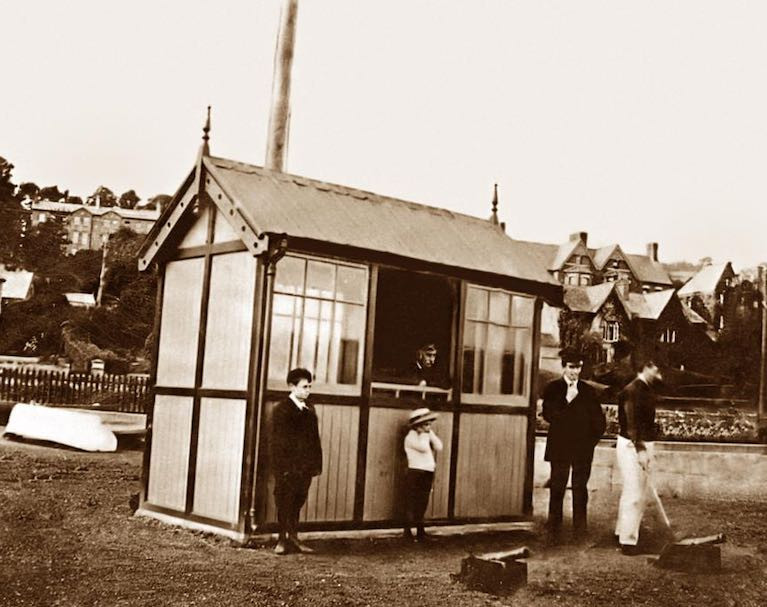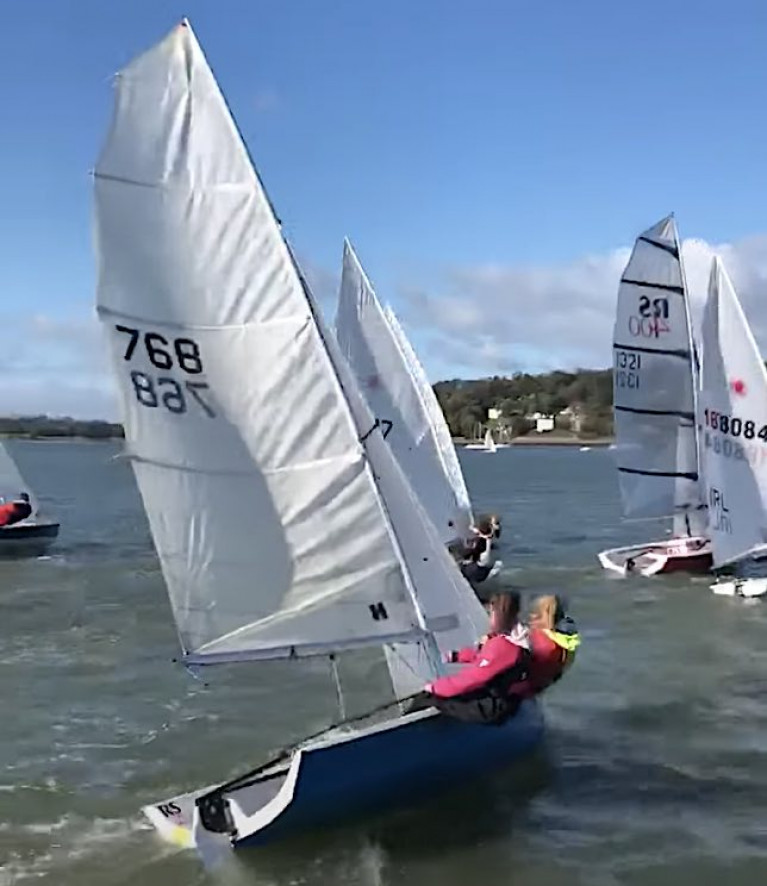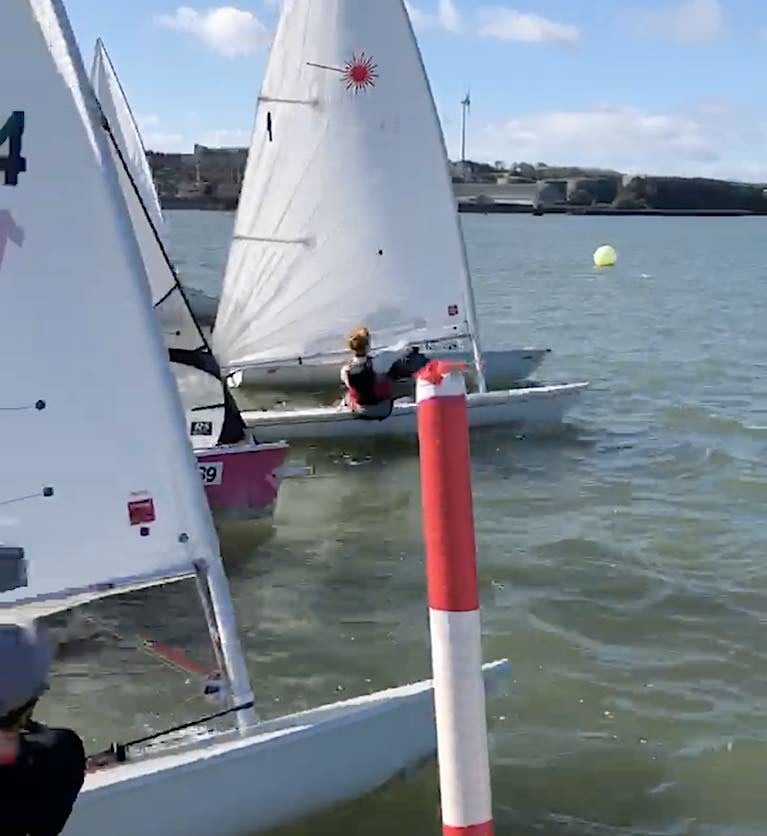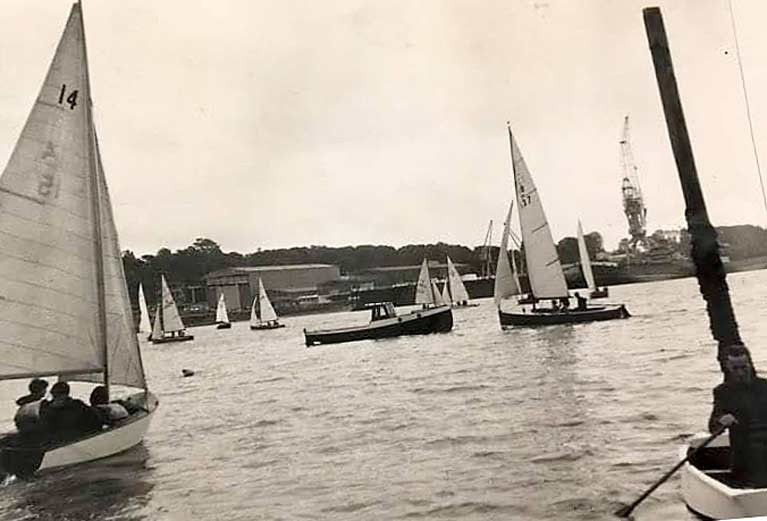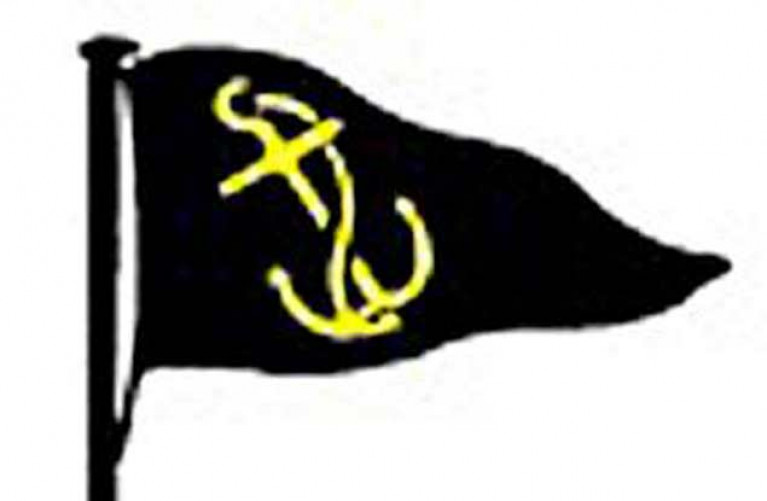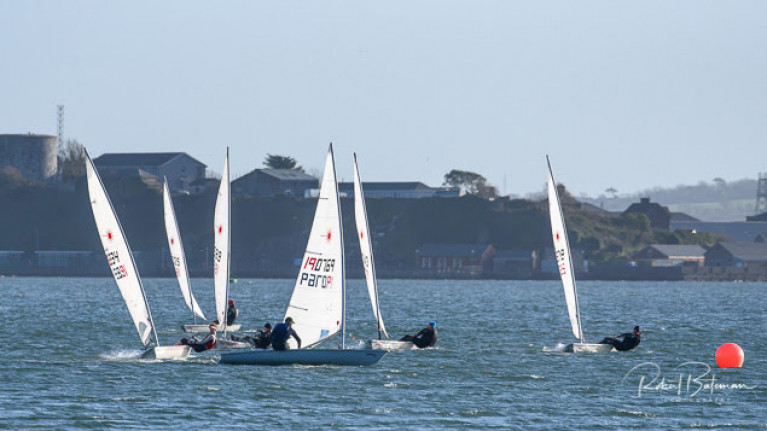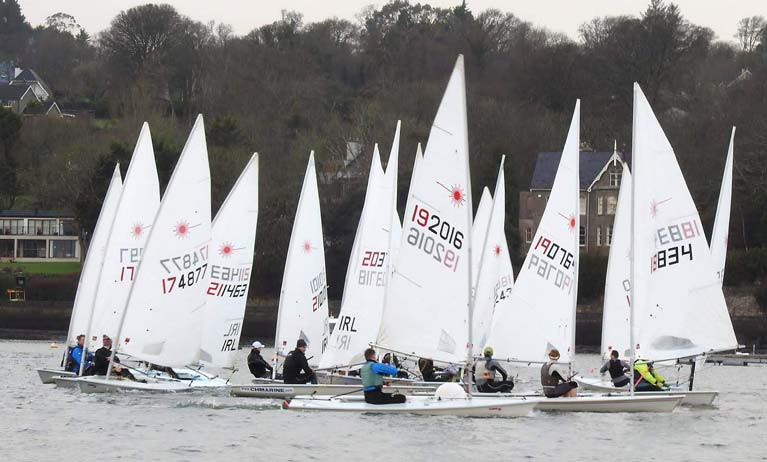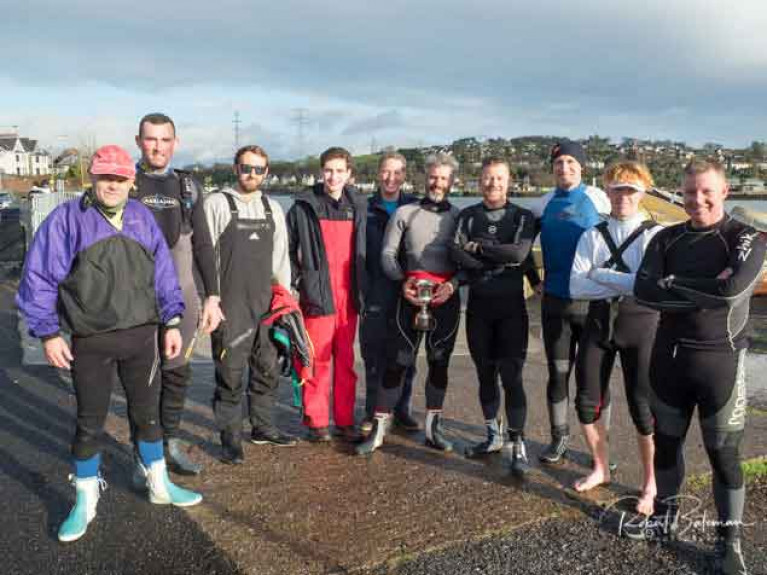Displaying items by tag: Monkstown Bay Sailing Club
Monkstown Bay Sailing Club's Resurgence in Cork Harbour: Podcast with Commodore Sandy Rimmington
Despite the impact of the pandemic Monkstown Bay Sailing Club in Cork Harbour has had a resurgence of numbers in dinghy league racing.
So outgoing Commodore Ciaran McSweeney told club members as he completed his two-year term in office.
New investment has been made in club facilities and there is a lot of hope in the village club on the edge of the harbour for next year.
It has bought a 1720 sportsboat, been donated a Drascombe Lugger, has more volunteers than before, more adults are seeking training and it also has put a new racing on the Sand Quay in the centre of the village, from where races are run. That is a short distance from the clubhouse at De Vesci Place. The hut has thrown "an invaluable light" on sailing history in Monkstown according to the outgoing Commodore. It makes Monkstown part of the history of the Royal Cork Yacht Club.
 Monkstown Bay Sailing Club's new race hut
Monkstown Bay Sailing Club's new race hut
Completing his two-year term of office he told members that the club had received a collection of photos of the Sand Quay and the famous hut from member John Hegarty. One of these shows uniformed Race Officers during a starting sequence on the quay for a yacht race that is thought to predate 1922.
"According to historian Dr Alicia St.Leger, the original hut was put in place by the Royal Munster Yacht Club in 1905. It remained there after that club departed for Crosshaven in 1922."
The Royal Munster later amalgamated with the Royal Cork which club had been based in Cobh and moved to Crosshaven to join the Royal Munster under the name of the RCYC. According to MBSC the "hut" remained on the quay and survived well into the 1950s. It was moved around the quay area several times, but the remains of an original concrete base can be seen slightly to the north of the location of the present hut. There have been others, right up to the new one.
Sandy Rimmington has been elected the new MBSC Commodore. Jacqui O'Brien is Vice Commodore.
Now listen to the Podcast below where my guest this week is the new MBSC Commodore.
Monkstown Bay Sailing Club Cancels October Dinghy League
Monkstown Bay Sailing Club in Cork Harbour has cancelled the rest of its October Dinghy League series due to the imposition of Level 3 COVID-19 restrictions.
The series started last Saturday and attracted a buoyant fleet of mixed dinghies including Lasers, RS400s, Fevas and Optimists as Afloat reported here.
All Ireland Junior champion Chris Bateman leads Class One of Monkstown Bay Sailing Club October Dinghy League after the first two races sailed from a boat start in Cork Harbour on Saturday.
Second in Class One's 18-boat fleet is fellow Laser sailor Brendan Dwyer. Alex Barry and Sandy Remmington are third in an RS400.
Despite the Laser Munster Championships being sailed on the same weekend at nearby Kinsale, 11 Lasers opted for the popular MBSC League with a cash prize.
A six boat Class Two is led by Laser 4.7 sailor Harry McDaid.
Provisional results are here.
Laser Sailor Ronan Kenneally Leads Monkstown Bay's September League in Cork Harbour (Photo Gallery Here!)
There was some great sailing breeze for a big weekend of dinghy racing at Monkstown Bay Sailing Club in Cork Harbour yesterday. MBSC is co-hosting the 1720 Munster Championships in the harbour as well as running its regular dinghy September League.
After eight races sailed in the club's September Open dinghy League 2020, Ronan Kenneally has a big lead in the Class One fleet counting six first places to lead by nine points from Brendan Dwyer also in a Laser. Philip Doherty in a Radial is third.
Lasers have a stranglehold on the leaderboard but an RS Aero (Emmet O'Sullivan) makes his presence known in the 22-boat fleet in fifth overall The first of several 505 dinghies (Brian Jones/Gary Frost) being raced at the club lies eighth overall.
In Class Two, Harry McDaid leads in a 4.7, from Tony Geraghty in an Optimist. Third is Kyle Joyce in a Feva.
Results are here
Bob Bateman's MBSC September Series Photo Gallery below
2020 was to be a year of special events in Cork Harbour. COVID 19 brought those plans to a crashing halt. The highest-profile hit was Cork Week and the events celebrating Cork 300, many of which are cancelled or in doubt at present. But tucked away in another part of the harbour lies a special club that had its very own anniversary this year.
Monkstown Bay Sailing Club came into being on Sunday, the 7th of June 1970. The six-strong committee of Mr Robert Cuppage, Mr Jack O’Driscoll, Mr Barry O’Connell, Mr Will O’Brien and Mr Dick Woodley was ably led by Mr Norcott Roberts.
Racing initially took place in Enterprises and other small dinghies on a handicap basis. The races were held in the evenings. The minimum subscription was 10/- which made you a founding member.
The village of Monkstown has always featured a strong sense of community and no place exemplifies this more than Monkstown Bay Sailing Club. Many families of founding members are still actively involved in the running of the club and as the club has grown in stature a full programme is conducted every year with no one left out. Class 1 and 2 dinghies still race of an evening and an active cruiser fleet races also.
 Monkstown Bay's first sailing course
Monkstown Bay's first sailing course
One of the first events organised by the club was an IYA sailing course. 40 aspiring young sailors attended, and the course was run by Mr Neville Eames.
To this day the courses have run introducing countless sailors to the pleasures and delights of sailing on Cork Harbour. In another consequence of the current pandemic, for the first time, in living memory, the sailing course has been cancelled. The sight of boats being rigged on a sunny morning by enthusiastic sailors will be sorely missed on the daily commute to work.
By way of compensation for the loss of the celebratory weekend, Monkstown Bay Sailing Club has commemorated their anniversary with a series of posts and commentary on their Facebook page and a series of WhatsApp messages to those members who are signed up to the various club groups.
In one of the initial posts, the twenty-seventh Commodore, Mr Ciarán Mc Sweeney greeted the membership with a wonderful letter commemorating the club’s anniversary and went on to announce the re-commencement of racing within guidelines in July for class 1 and a slightly restricted version for class 2.
It is also intended to run some training for level 3 and 4 junior sailors to complete their certificates.
Looking further ahead the club will exhibit items of historical interest in the Passage West Maritime Museum later in the year when it reopens. It is also noted that the anniversary celebrations have merely been postponed and an opportunity to celebrate will be taken later in the year as circumstances permit.
“For the first time since1972 we must sadly announce that we are unable to run our Junior Sailing Course this year as planned,” Monkstown Bay Sailing Club announced this week. “After completing a risk assessment in line with Irish Sailing’s guidelines and in keeping with government advice we feel that, for the safety of club members, families and the wider community, this decision had to be taken.”
The popular Cork Harbour courses which introduce young people to the sport have been run annually in the summer months, June-July.
“We are looking at possible options to complete some courses towards the end of the summer for some of the levels,” the club said.
It is hoping to run a July dinghy league, though a format has not yet been decided.
Epic Laser Dinghy Racing at Monkstown Frostbite League
It was February 1st, and the hardy band of Cork Harbour Laser sailors regrouped for day three of the Monkstown Laser Frostbite League, in beautiful racing conditions.
A low sun arose over Cork Harbour in the early hours of the morning. A slight chill in the air was enough to inflict a bite, but not enough to stop thirteen enthusiastic sailors from arriving on the Sandquay at 9 am. A windy forecast was on the cards and gusts of up to 27 knots were due later in the morning. The sky was cloudless and Monkstown Bay looked promising.
A south-westerly breeze blew across the bay, peaking at a low 10 knots of wind. The tide was high and weak. The competitors launched their Lasers off the Sandquay, to join the race committee.
A windward/leeward course had been set, with a windward mark situated in the creek near Raffeen. The 10:10 am scheduled start was right on time and the thirteen Laser sailors found their positions on the small start line. Three minutes went by and race one was underway.
 Sailors in shot (Left to right) Fionn Lyden, Chris Bateman, James Long, Alex Barry (IRL)
Sailors in shot (Left to right) Fionn Lyden, Chris Bateman, James Long, Alex Barry (IRL)
Launching off the line was MBSC’s Ronan Kenneally, who crossed the fleet with a spectacular port tack flyer. This put him into the lead just ahead of the fleet. Conditions were tough, with a gusty wind mixing things up. Kenneally held his lead around the windward mark just in front of BSC’s Fionn Lyden MBSC’s Chris Bateman. But things were not all as they seemed and the ace Finn sailor (Lyden) sailed past Kenneally using his downwind skills. The breeze was increasing slowly as they sailed downwind. Bateman chose the opposite side of the course and managed to round the leeward mark just ahead of Lyden and Kenneally. Paths were chosen carefully as the competitors travelled upwind, working through the shifty wind. All remained vigilant and two rounds later, your correspondent took first place. Taking the second position was Lyden, with Kenneally following just behind in third.
In the Radial category, MBSC’s Harry Pritchard took first place, with MBSC’s Philip Doherty following up in second place.
Race two began with much more wind. There was now a steady 13-knot wind gusting up over 16 knots. The high tide was still weak and the competitors had no trouble beating up to the mark. Pulling away into the lead was Sunday’s Well sailor Paul O’Sullivan, followed by radial sailor Philip Doherty in second. The top mark was seeing heavy wind and a wild gust caught out O’Sullivan, as he spun into an almost-saved death roll. This capsize let Doherty pull into the lead, with Bateman just behind. Doherty blasted away from the fleet in the high wind and rounded the leeward mark in first. As they continued on the upwind leg, Doherty’s radial rig lacked the extra ‘grunt’ in the lulls, allowing your correspondent to sail through in the full rig. The last downwind leg saw Fionn Lyden sail through the radial sailor, followed up by MBSC’s Alex Barry. Taking first place was Bateman and in second place was Lyden. Light-weight sailor Alex Barry managed the heavy weather well and took third place.
In the Radial category, MBSC’s Phil Doherty showed heavy weather speed and took a comfortable first place. MBSC’s Harry Pritchard followed up in second, having struggled in the big breeze.
The wind had piped up for race three, the last race of the day. A strong, gusty wind blew across the land from the west. These are tricky conditions at best, with rogue wind shifts threatening to capsize the laser dinghies. The competitors set off and immediately started to work their boats to maximum speed. Leading around the windward mark was O’Sullivan, with Kenneally in second. A heavy gust of over 22 knots let Kenneally sail through O’ Sullivan. As the competitors planed towards the leeward mark, the wind was gusting over 25 knots. Your correspondent sailed around the leeward mark just ahead of Kenneally, with Lyden closing in. The wind whipped across the water, making the windward mark rounding a task. Lyden and Kenneally battled it out, with Kenneally sailing over the top of Lyden. The heavy wind was of no moment to the fleet as they all blasted downwind to the finish line. Taking first place was your correspondent. In second position was Kenneally, with Lyden sailing through into third.
In the Radial fleet, Heavy weather specialist Phil Doherty took another win. Harry Pritchard finished up in second place.
So, a great end to what was an epic morning on the water. The sailors headed for shore, whipped with wind and spray. Warmth and rest awaited on shore, all the that was needed to relax after a hard morning’s sailing.
Join us next week on the water, where the stellar race committee and mark layers will make sure you get the most out of your Saturday morning, and will never disappoint!
Record Fleet for Monkstown Bay Laser Frostbite League
On Saturday 25th of January, the Monkstown Bay Laser Frostbite league rolled around for day two of the month-long Cork Harbour series.
A mixed bag of weather conditions was in store for the competitors, with a dull sky and black clouds dampening the mood. The air was warmer than usual, so comfort levels were at their peak. A south-westerly breeze was blowing up around 9-12 knots. The Sandquay was busy, as a record number of sailors had arrived to enjoy the morning’s racing.
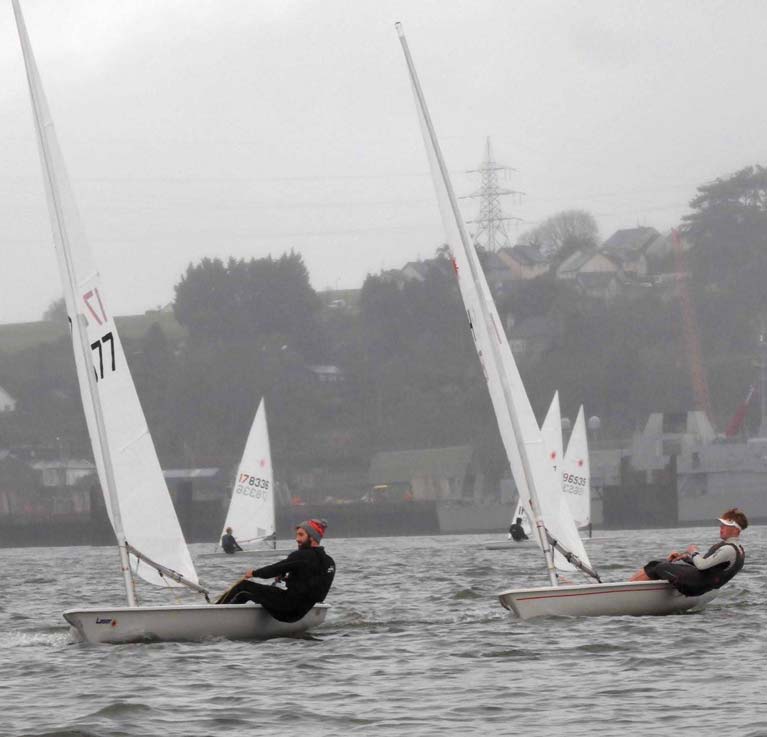 Richie Harrington (left) Chris Bateman (Right) Fighting for lead Photo: Ali Harvey
Richie Harrington (left) Chris Bateman (Right) Fighting for lead Photo: Ali Harvey
The start was due for 10:10 am, so Race Officer Alan Fehily and his crew were seen setting up a course in the early hours. The fleet launched with time to spare and could be seen sailing out into the channel under a heavy flood tide. A windward/leeward course was set opposite Alta Terrace.
The 3-minute gun went off at exactly the scheduled time. The record-sized fleet of sixteen boats lined up on the start line, jousting for position. The competitors could be seen trying to stay below the line, with a very strong flood tide dragging them over early. One general recall later and the first race of the day was underway.
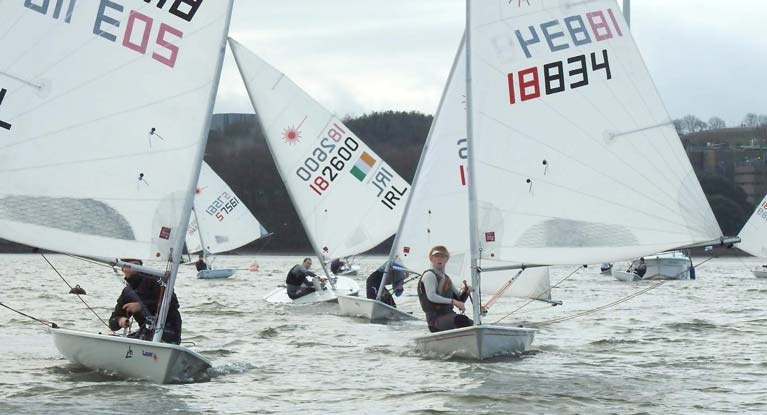 Fionn Lyden (left) Chris Bateman (right) fighting for lead Photo: Ali Harvey
Fionn Lyden (left) Chris Bateman (right) fighting for lead Photo: Ali Harvey
As the fleet converged at the top mark, it became apparent how much the tide was affecting the race. A perfect path had to be chosen, with most sailors heading to the left side of the course just outside the shipping channel. MBSC’s Brendan Dwyer took an early lead and extended that lead throughout the race. Challenging for second and third were Monkstown’s Chris Bateman and Fionn Lyden from Baltimore sailing club. Dwyer held them off until the third and final lap, where your correspondent managed to slip into first place, with Lyden in second. RCYC’s Johnny Durcan followed in third place. As the race carried on, Lyden sailed past Bateman on the downwind to finish in first place. Your correspondent took second position, with Durcan making up third.
In the radial fleet, MBSC’s Harry Pritchard took first place, with RCYC’s Michael Crosbie in second and MBSC’s Philip Doherty in third.
Race two began with the same strong tide but with a little less wind. The fleet was close as they made their way up the first beat, beginning the three-lap race. Tactics downwind were crucial, as the tide was head-on. Your correspondent took the lead early on, with Durcan following and MBSC’s Ronan Kenneally right behind. The sun had come out and the water was a clear blue. Bateman gybed away from the fleet onto the shoreline, while Durcan elected to stay out in the tide, but with more wind. By the end of the race, Bateman finished out in front with Durcan in second place. Kenneally finished in third position.
 Bateman in lead, Durcan in second place Photo: Ali Harvey
Bateman in lead, Durcan in second place Photo: Ali Harvey
In the Radial category, it was Pritchard taking first place, with Crosbie and Doherty following up in second and third.
Race three began with MBSC’s Richie Harrington taking an early lead. Following in second place was your correspondent, with Durcan in third place. Harrington increased his lead throughout the race, in the light and tricky conditions. Brendan Dwyer sailed through on the last downwind, passing out Durcan and Bateman, but could not hold Durcan with his new-school tacking manoeuvres. Meanwhile, Harrington sailed across the line in first place with a comfortable lead. Durcan sailed into second, with your correspondent making up third place.
A tough morning’s racing was enough to finish off the competitors, and the laser dinghies were put to bed, to be woken again next Saturday.
Monkstown Bay Sailing Club's Raft Race in Cork Harbour Raises Funds for Pieta House
Monkstown Bay Sailing Club in Cork Harbour finally got their sixth annual Raft Race underway this morning, it having been cancelled due to weather on 26th December writes Bob Bateman
Fundraising for Pieta House, the charity that offers free support for those in suicidal distress or engaging in self-harm, competitors took to the water with all the fun and excitement that goes with raft racing.
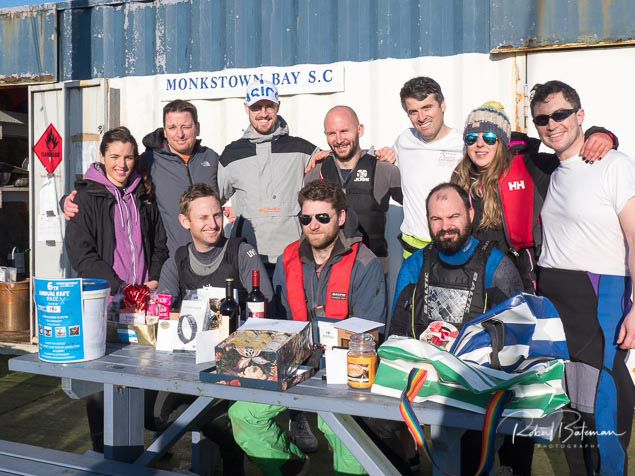 (Front Row) Alex Barry, Ken Murphy, Brian Dinneen. (Back Row) Aine Bogue, Conor O’Keeffe, (aiming to raise €100,00 for Pieta House by running 32 Marathons in 32 days) Nin O’Leary, Jenny Meade, Shane Kennedy
(Front Row) Alex Barry, Ken Murphy, Brian Dinneen. (Back Row) Aine Bogue, Conor O’Keeffe, (aiming to raise €100,00 for Pieta House by running 32 Marathons in 32 days) Nin O’Leary, Jenny Meade, Shane Kennedy
This was the sixth running of the event and this year funds raised were added to the pot for Conor O’Keeffe’s attempt at raising €100,000 for Pieta House by running 32 Marathons in as many days.
Photo gallery By Bob Bateman
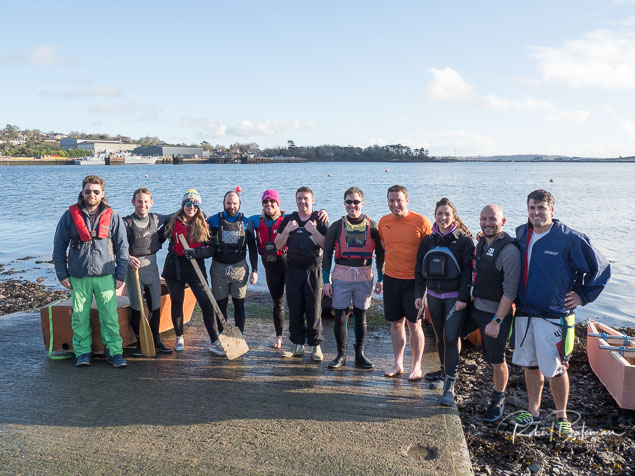 The starting crews at MBSC
The starting crews at MBSC
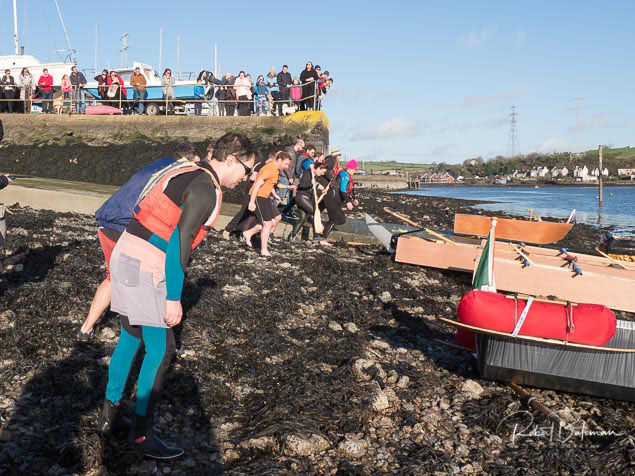 A Le Mans-style start
A Le Mans-style start
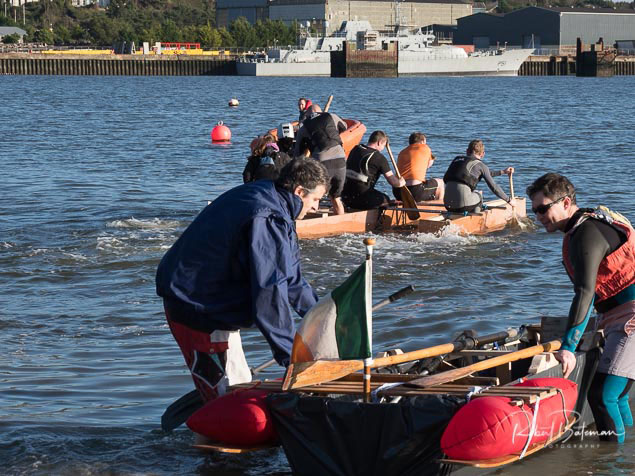 There were some late starters...
There were some late starters...
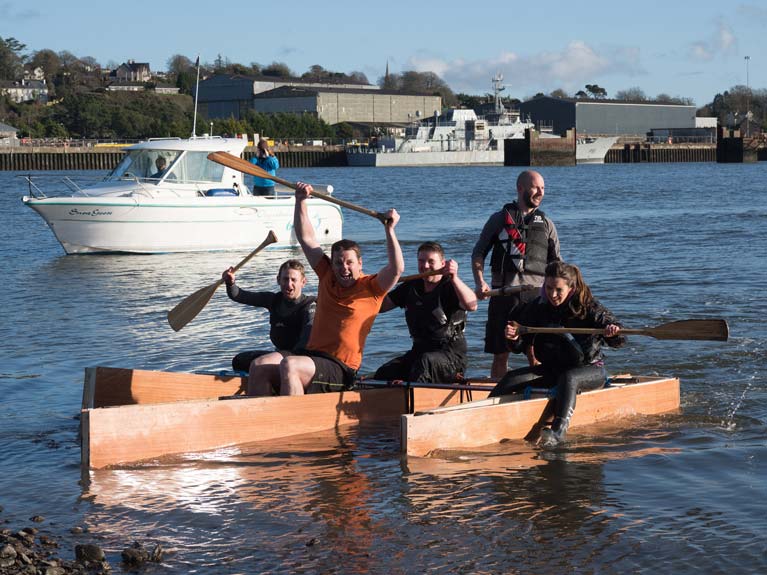 The Winning Team in the annual Monkstown Bay Sailing Club Raft Race. The team consisted of Alex Barry, John Downey, Steve Higgins, Sandy Rimmington and Aine Bogue
The Winning Team in the annual Monkstown Bay Sailing Club Raft Race. The team consisted of Alex Barry, John Downey, Steve Higgins, Sandy Rimmington and Aine Bogue
 Competitors gave it their all
Competitors gave it their all
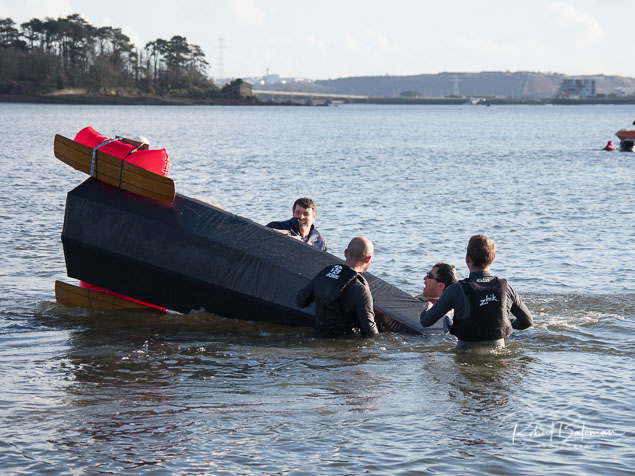 Sandy Rimmington and Alex Barry ensured that Nin O'Leary did not finish without a ducking in chilly Cork Harbour
Sandy Rimmington and Alex Barry ensured that Nin O'Leary did not finish without a ducking in chilly Cork Harbour
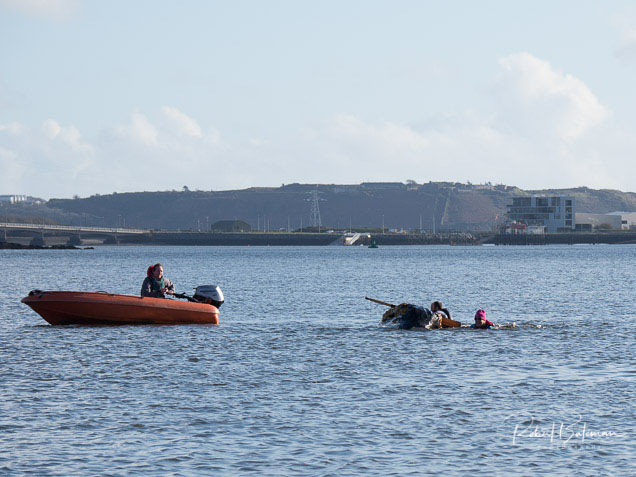 Dave Kenefick on rescue boat duty keeps a watchful eye on this capsized craft
Dave Kenefick on rescue boat duty keeps a watchful eye on this capsized craft
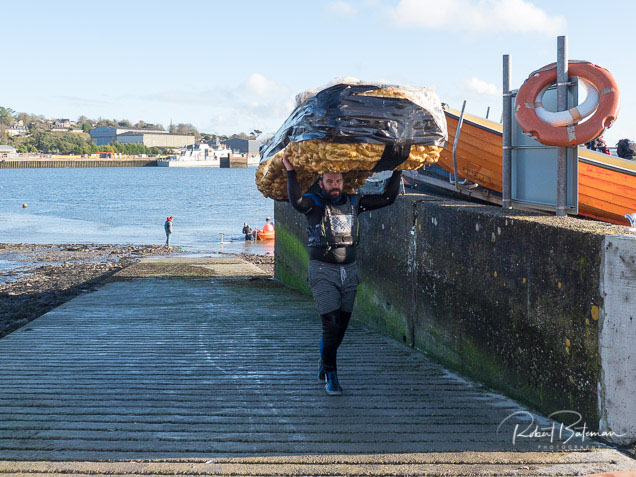 Raft Racecraft were all shapes and sizes
Raft Racecraft were all shapes and sizes
Monkstown Bay Laser Sailors Race in St. Stephen's Day Race
Monkstown Bay Sailing Club Laser sailors were afloat again today for the annual St. Stephens Day Race in Cork Harbour.
In light winds, Paul O’Sullivan was the winner of the Dr Magner Cup.
The St Stephen's Day fixture race precedes the MBSC Open Winter Laser Series that starts on Saturday, January 11th with First Gun at 10:10 (Boat Starts) as close as possible to the Sandquay.
There are three races per day scheduled. Open to all Laser and Radials. The series concludes on Saturday, February 15th


























